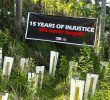1. Dangerously vague definition
The definition of �terrorism� is deliberately made vague and overbroad. Section 3 of the terror law defines �terrorism� as an act of �sowing and creating a condition of widespread and extraordinary fear and panic among the populace in order to coerce the government to give in to an unlawful demand.�
The parameters of what constitutes this vague and loosely defined crime of �terrorism� will eventually be determined by Malacanang through the Justice Department and its notoriously unjust secretary, Raul Gonzalez, and the newly formed Anti-terrorism Council which includes the right-wingers and fascists in the Cabinet Oversight Committee on Internal Security such as Executive Secretary Gen. Eduardo Ermita and National Security Adviser Norberto Gonzales.
With this kind of definition and the people that will determine its application, Arroyo can use the law as an instrument to quell legitimate expressions of political dissent and social protest. For example, mass actions calling for the ouster of Arroyo are already labeled as part and parcel of �destabilization plots� and �conspiracies to commit rebellion�; thus, it would be easy for the government to classify them as �coercing the government to give in to an unlawful demand.� Workers strikes have also been categorized by the Arroyo regime as �terroristic� and tantamount to economic sabotage.
Constitutional experts have asserted that the law is void because it is vague. At the heart of the debate on the new terror law is the basic definition of terrorism from where abuses will inevitably arise. To date, there is yet no internationally accepted definition of terrorism. The term “terrorism” has been used by imperialist states and their allies during the Cold War era to demonize and delegitimize national liberation movements waging armed revolution against colonialism and neocolonialism. Back then and even up to now, one man�s terrorist could be another man�s freedom fighter.
Were “terrorism” to be properly defined to refer to systematic and deliberate violence used solely or mainly against civilians or entire communities of people, imperialist wars of aggression and state terrorism would then be recognized as the worst kinds of terrorism by the sheer amount of death and destruction as well as socio-cultural degradation inflicted on entire peoples and civilian populations.
The number of less than 3000 civilian death casualties in the 9/11 attacks is small in comparison to the 1.5 million Iraqi death casualties in the US-UK war of aggression and sanctions against Iraq and the more than 650,000 Iraqi civilian death casualties in the second war of aggression and occupation of Iraq.
State terrorism or the rule of open terror within particular states is another form of terrorism. It usually entails the repression of the entire people through massacres, assassinations, illegal detention and torture and the displacement of people from their homes and land with the use of armed force
By making “terrorism” as a catch-all crime that is too vague and too broad, the imperialists and their puppet states have messed up the clear distinction between common crimes and political offenses. The punishment for political crimes is usually lighter than common crimes because the former are considered socially motivated rather than driven by self-interest and may be open to political solution through negotiations and satisfaction of social demands. But the US has made it a point to define terrorism as the threat or use of violence against persons and property to “advance social and political objectives”. It is hell-bent on criminalizing as “terrorism” the people’s struggle for national and social liberation.
Judging from the recent pronouncements and practice of the regime, the first casualties of the proposed bill would be members of revolutionary armed movements, like the CPP/NPA/NDF and the MILF. This would be contrary to established Philippine jurisprudence such as the Hernandez Doctrine, which states that all acts in pursuit of one�s political beliefs are absorbed in one crime of rebellion and cannot be divided into several common crimes.
The Arroyo government has long been itching to tag the CPP-NPA-NDF as terrorist organizations. There have also been actuations on the part of the Arroyo regime tagging the MILF as a supporter of so-called terrorist organization like the Jemaah Islamiya. Also in danger of being tagged as �terrorists� are groups which state agents have already labeled as �communist front organizations� and �enemies of the state�. These include legal and legitimate people�s organizations, which are already facing various forms of harassment under the present system.
Apart from a vague definition of terrorism, Sec. 17 of the proposed bill allows for the proscription of alleged �terrorist� organizations on the mere application by the Department of Justice before any Regional Trial Court. All it takes is for Raul Gonzales to file a case before any RTC and an organization, association or group of persons may be declared as a �terrorist� and thus, outlawed.
Subsequently, it would also be easy to arrest and detain indefinitely individuals as officers and members of “terrorist” organizations or as accomplices and accessories in the commission of “terrorism”. Members of an already proscribed organization can be easily subjected to rigorous surveillance and punitive sanctions. These make the Anti-Terror Act a bill of attainder, which criminalizes and punishes individuals on the basis of guilt by association.
Terrorism









